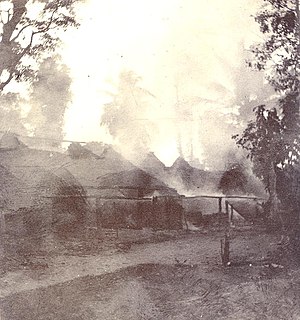 W
WColonial Nigeria was the era in the History of Nigeria when the region of West Africa was ruled by Great Britain in from the mid-nineteenth century until 1960, when Nigeria achieved independence. British influence in the region began with the prohibition of slave trade to British subjects in 1807. Britain annexed Lagos in 1861 and established the Oil River Protectorate in 1884. British influence in the Niger area increased gradually over the 19th century, but Britain did not effectively occupy the area until 1885. Other European powers acknowledged Britain's dominance over the area in the 1885 Berlin Conference.
 W
WNigeria competed in the Summer Olympic Games for the first time at the 1952 Summer Olympics in Helsinki, Finland.
 W
WNigeria competed at the 1956 Summer Olympics in Melbourne, Australia.
 W
WParliamentary elections were held in Nigeria on 12 December 1959. The result was a victory for the Northern People's Congress, which won 134 of the 312 seats in the House of Representatives, despite the Action Group winning more votes. It formed a coalition with five other parties and two independents, holding a total of 148 seats. Voter turnout was 79.5%.
 W
WThe Anglo-Aro War (1901–1902) was a conflict between the Aro Confederacy in present-day Eastern Nigeria, and the British Empire. The war began after increasing tension between Aro leaders and British colonialists after years of failed negotiations.
 W
WFilmmaking in Colonial Nigeria generally refers to an era in Nigerian cinema, usually spanning the 1900s through to the 1950s, when film production and exhibition or distribution were controlled by the British colonial Government. The history of cinema in Nigeria dates back to as early as the history of film itself; notably in the late 19th century, with the use of peephole viewing of motion picture devices. These were soon replaced in the early 20th century with improved motion picture exhibition devices, with the first set of films screened at the Glover Memorial Hall in Lagos from 12 to 22 August 1903.
 W
WThe Flag of Nigeria between 1914 and 1960 was a British blue ensign with a green Star of David surrounding a Tudor Crown with the white word "Nigeria" under it on a red disc. It was adopted by the Colony and Protectorate of Nigeria following the amalgamation of the Southern Nigeria Protectorate and Northern Nigeria Protectorate.
 W
WThe Government Gazette was the government gazette for the British colony of Lagos. It was published between 1887 and April 1906.
 W
WThe Government Gazette of the Protectorate of Southern Nigeria was the government gazette for the Protectorate of Southern Nigeria. It was published at Old Calabar between 1900 and 1906.
 W
WLagos Colony was a British colonial possession centred on the port of Lagos in what is now southern Nigeria. Lagos was annexed on 6 August 1861 under the threat of force by Commander Beddingfield of HMS Prometheus who was accompanied by the Acting British Consul, William McCoskry. Oba Dosunmu of Lagos resisted the cession for 11 days while facing the threat of violence on Lagos and its people, but capitulated and signed the Lagos Treaty of Cession. Lagos was declared a colony on 5 March 1862. By 1872 Lagos was a cosmopolitan trading center with a population over 60,000. In the aftermath of prolonged wars between the mainland Yoruba states, the colony established a protectorate over most of Yorubaland between 1890 and 1897. The colony and protectorate were incorporated into Southern Nigeria in February 1906, and Lagos became the capital of the protectorate of Nigeria in January 1914. Since then, Lagos has grown to become the largest city in West Africa, with an estimated metropolitan population of over 9,000,000 as of 2011.
 W
WThe Niger Coast Protectorate was a British protectorate in the Oil Rivers area of present-day Nigeria, originally established as the Oil Rivers Protectorate in 1884 and confirmed at the Berlin Conference the following year. It was renamed on 12 May 1893, and merged with the chartered territories of the Royal Niger Company on 1 January 1900 to form the Southern Nigeria Protectorate.
 W
WThe Nigeria Gazette was the government gazette for the Colony and Protectorate of Nigeria. It was published at Lagos between 1914 and 1954.
 W
WThe Northern Nigeria Gazette was the government gazette for the British colony of the Northern Nigeria Protectorate. It was published between 1900 and 1913.
 W
WNorthern Nigeria was a British protectorate which lasted from 1900 until 1914 and covered the northern part of what is now Nigeria.
 W
WNorthern Nigeria was an autonomous division within Nigeria, distinctly different from the southern part of the country, with independent customs, foreign relations and security structures. In 1962 it acquired the territory of the British Northern Cameroons, which voted to become a province within Northern Nigeria.
 W
WThe Royal Niger Company was a mercantile company chartered by the British government in the nineteenth century. It was formed in 1879 as the United African Company and renamed to National African Company in 1881 and to Royal Niger Company in 1886. In 1929 the company became part of the United Africa Company, which came under the control of Unilever in the 1930s and continued to exist as a subsidiary of Unilever until 1987, when it was absorbed into the parent company.
 W
WThe Southern Nigeria Government Gazette was the government gazette for the Colony and Protectorate of Southern Nigeria. It was published at Lagos between 1907 and 1913.
 W
WSouthern Nigeria was a British protectorate in the coastal areas of modern-day Nigeria formed in 1900 from the union of the Niger Coast Protectorate with territories chartered by the Royal Niger Company below Lokoja on the Niger River.
 W
WThe Southern Nigeria Regiment was a British colonial regiment which operated in Nigeria in the early part of the 20th century.